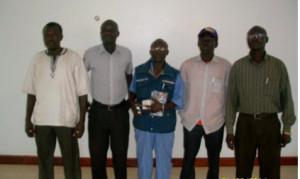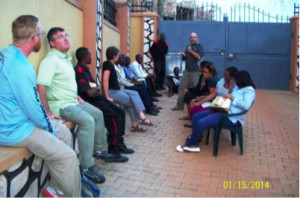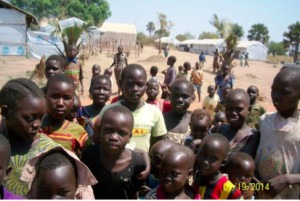He still doesn’t waste anything
In a weekly Bible study with our guards, we’re walking through the Gospel of Mark. It’s been fun and rewarding. The guys have taught me so much.
This week we’re camping out in Mark 6 and Jesus’ Feeding of the Five Thousand.
I’ve always loved the end of the story. “And they took up twelve basketfuls.”
I’m going to ask Andrew when I see him (he was the architect of the 5/2 to 5000) what they did with the leftovers.
I love that about my Jesus. He doesn’t waste one thing.
I was reminded of that last week.
We (the Louisiana pastors) accompianed our local church leaders/friends to several refugee camps. Thousands of South Sudanese are flooding into Uganda, Kenya, and Ethiopia to escape the random ethnic violence. We met folks from every tribe. War and hatred is an equal opportunity offender whether you’re Dinka, Nuer, or nothing.
These African church leaders shared a word of encouragement with hundreds who gathered to gawk at us (Mzungu) and listen to the Gospel in their heart language.
Each one of our African men: Mark, Daniel, Moses, Bakik, and Charles had all spent time as refugees. “We’ve been exiled. We know how you feel.”

These men also spoke the heart languages of the refugees: Kakwa as well as Arabic. They’d learned Arabic during their bleak exiles in Khartoum, Sudan or other points far from home.
I was reminded again that Jesus still doesn’t waste one thing.
He even takes the painful things in our lives (we all have them but few Western hurts can equal what many Africans have experienced) and crafts us to help others.
This personal understanding of the hurts of others is called empathy.
Empathy. It’s so much stronger than its cousin, sympathy.
“I’ve been exiled. I know how you feel.”
Moses reminded the mass of people. “You will get through this because of God’s faithfulness. He is enough. We know. We’re been there.”
Charles pointed to the area. “I was right here as a refugee during the worst years of the Civil War.”
I saw flickers of hope in downcast eyes. Later, when the crowd sang an African praise song, their voices rose in pitch and strength.
I thought of another exile who told his brothers twenty years after their treachery, “What you meant for evil, God meant for good.” Joseph’s words in Genesis 50:20 never cease to amaze me. God didn’t waste one second of Joseph’s slave and prison years. It was all used.
He is still faithful.
He can be trusted.
He catches your tears in a bottle.
He doesn’t waste them.
On BEING A MEDIATOR
I’ve gotten in lots of trouble in my life trying to mend things between folks.
I have a good story about bringing two rural families together at school to end a long-running feud that had started over a deerstand. The children of each family kept fighitng at at school so I decided to bring the parents in and help solve the problem.
The two fathers who were big men , Mule Taylor and James Franklin, hadn’t been in my office for five minutes when they were up in each other’s faces. The women began screaming at each other. It wasn’t my brightest moment as a mediator but the story had a happy ending.
I should’ve learned better.
When I visit Rhino Camp, I’m going to find Simon and Jimmy. The three of us are going to sit down over a pot of African tea and visit.
I met both of them last week at the border. The South Sudan/Ugandan border.
Simon, a Dinka Bor, told me his sad story of leaving the fighting behind to escape. I asked what other tribes were present.
“Mostly we Dinka.” He nodded toward a mango tree. “Those people are Nuer.”
“Are they your enemies?”
Simon looked at me. “I guess not, but they are Nuer.”
Leaving the camp, I went to the tree and introduced myself to a young man with the distinctive forehead scars that identify the Nuer.
His name was Jimmy and his family had fled from Unity State, the source of much of South Sudan’s oil as well as recent violence.
I have his name.
Lord willing, I’ll find both of them. Simon and Jimmy. I’m determined to get them together. Just the three of us. I’ve seen a pot of hot of coffee and buttered biscuits mend a church split. I wonder if sweet African tea and fresh chapatis might do the same.
Stay tuned.
 Creekbank Stories Curt Iles, Storyteller
Creekbank Stories Curt Iles, Storyteller


